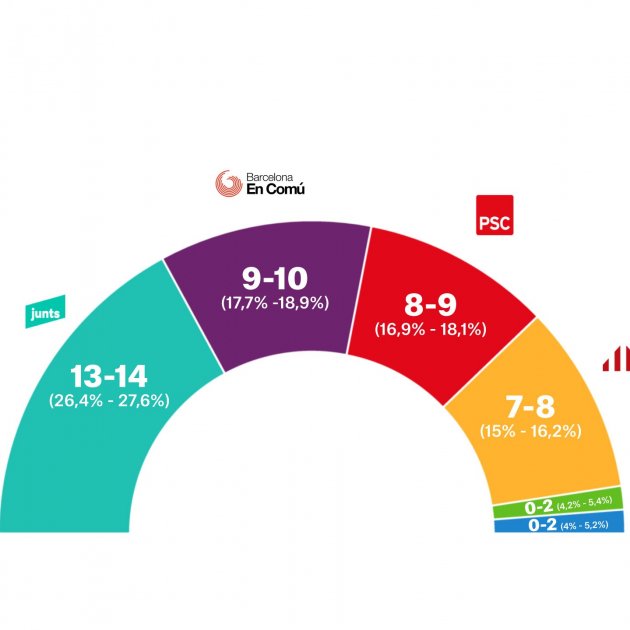If the Barcelona municipal elections due on May 28th were held tomorrow, Xavier Trias, former mayor and Together for Catalonia (Junts) candidate, would easily prevail over the current city mayor and leader of Barcelona en Comú (BComú), Ada Colau and the rest of the most immediate competitors in the electoral race: Jaume Collboni, of the Catalan Socialists (PSC) and Ernest Maragall of the Republican Left (ERC). This is the result of a GAPS survey commissioned by Junts to which ElNacional.cat has had access. Thus, Trias would obtain 13 to 14 councillors on the 41-seat council, and between 26.4% and 27.6% of the votes, far ahead of Colau, who would get 9-10 seats and between 17.7% and 18 .9%; in third place would be Collboni, with an allocation of 8-9 councillors (16.9-18.1%) and in fourth spot Maragall, with 7-8 (between 15% and 16.2% of the votes). Vox and the PP could both be left out of the council: the survey gives them between 0 and 2 councillors with 4.2-5.4% for the extremists and 4%-5 .2% for the other right-wing party. The poll says that the far-left, pro-independence CUP, with a vote projection of between 2 and 3.2%, would definitely be left out, with zero councillors. Neither would Ciudadanos (Cs) accede to the city council of the Catalan capital, obtaining no council seats, and a vote percentage of between 1.7 and 2.9%.
According to the survey, carried out at the end of March with the participation of 802 respondents, the so-called Trias effect is confirmed and could return him to the mayoral office which he held between 2011 and 2015, as the candidate of CiU. In 2011, Trias won 15 council seats. Now, if the polling data is confirmed, in the best scenario he would be within 7 seats of an absolute majority - 21 councillors - but his main competitors could only bar his way with a left-wing tripartite that would revalidate Ada Colau as the occupant of the mayor's office. In the survey, the Junts candidate almost triples the 5 councillors obtained by his party in the previous elections, those of 2019; Colau either loses 1 seat or keeps her current 10; Collboni, who got 8 last time out, stays where he is or gains 1, and Maragall, who was actually the winner of the 2019 election, would drop from 10 to 7 or 8 seats. Vox, without representation up till now, and the PP, which obtained 2 councillors with Josep Bou in the last election and is now led by Daniel Sirera, are along with Cs, disputing the block of conservative, pro-Spanish voters which were captured by former French prime minister Manuel Valls in 2019, obtaining 6 councillors that served - in a surprise post-election twist - to return the alternative-left Colau to the mayoral office and keep out the pro-independence election-night winner, Maragall.
Trias, the option of change
According to the survey, 67.6% of Barcelona residents believe that the city's problems have worsened. At the top of the list of problems, they cite law and order (35.0%), followed by access to housing (30.1%) and municipal and mayoral political management (24.2%). The municipal government of Colau, made up of BComú and the PSC, gets a fail mark, at 4.4 out of 10. Of those who believe a change in the municipal government to be necessary, the largest proportion (18.6%) opt for Trias to lead it, followed by Maragall (7.3%), Collboni (5.2%) and Colau (3.7%). As for the preference for who should be the next mayor of the Catalan capital, Trias prevails with 26.8% followed by Colau, a long distance back, with 12.9% and Maragall with 8.9%. Nevertheless, when respondents are asked who they think will be mayor, Trias and Colau tie with 24.8%, which shows the bipolarization of the elections between the two as the candidates with the best chance of winning the mayoral staff.
Trias is, moreover, the most highly rated leader (5.7 on average), followed by Maragall (5.2) and already with fail grades, Collboni (4.3), Sirera (3.9) and Colau, who collects a 3.6. Trias confirms the transversality of his appeal as mayor in the respondents' ratings by party of allegiance: in addition to those of Junts (7.4), he is approved of by the voters of ERC (6.2) and the PSC (5.1) and almost makes the grade among those of BComú (4.7). Maragall is below Trias in terms of the average assessment, but gets a pass mark from the voters of all the main parties: a 6.7 from his own people in the ERC; a 5.8 from Junts; a 5.6 from those who vote BComú and a 5.0 from the Socialists, his former party. The current Socialist candidate Collboni is given a pass by his supporters in the PSC, with a 6.3, and in BComú, with a bare 5.0. On the other hand, Colau is only approved by her dedicated supporters in BComú, with whom she scores a 6.7.
